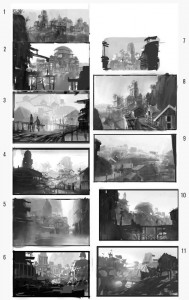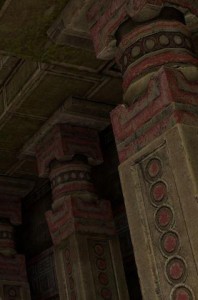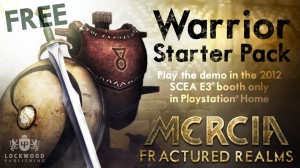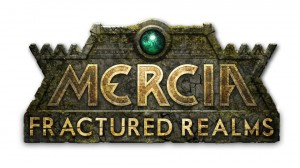The Mercia Demo
by BONZO, HSM team writer
The nightmare of trying to be among the excited first to try the Mercia demo was finally behind me, and I was overwhelmed, not just by what I saw, but what I heard — the beautifully fitting musical score that puts you in that fantasy place. The initial space is visually astonishing, and for a moment you forget you are in Home. I looked around, scrutinizing the technical details of the environment. There are a wide variety of spaces in Home, all different, but all immediately recognizable as a Home space. It’s somewhat like being at Disneyland, and knowing you are in Disneyland even as you move from one themed area to another.
 This is unlike any previous game integration themed space, and what separates it is the avatar locomotion. Total game integration games are limited by development time and the restrictions of the avatar mechanics already in place for Home. The mechanics of avatar locomotion can feel very unnatural, and limited in a game setting. No better example of this than in the Uncharted 3 total game integration space. You didn’t really feel like you were a part of that space, as you directed which path to go from limited options and then just sat back and observed as the avatar was pre-animated to move in that direction. You basically hit the play button.
This is unlike any previous game integration themed space, and what separates it is the avatar locomotion. Total game integration games are limited by development time and the restrictions of the avatar mechanics already in place for Home. The mechanics of avatar locomotion can feel very unnatural, and limited in a game setting. No better example of this than in the Uncharted 3 total game integration space. You didn’t really feel like you were a part of that space, as you directed which path to go from limited options and then just sat back and observed as the avatar was pre-animated to move in that direction. You basically hit the play button.
Mercia isn’t a total game integration space, though. It is an in-Home game, but it doesn’t feel like walking through the Hub in that iconic power jog motion, as it does in games like Aurora or the now removed Conspiracy. The locomotion is unique to Mercia, which immerses you further into that environment. It is such a subtle change, that at first you don’t even realize you are moving differently — but is is so important to submerging you in the environment created for this fantasy realm. Your avatar at a standstill has a unique alert stance, shield ready and sword in hand. The walk is tentative and cautious, and as you move more slowly, it looks stealthy.
The music really engulfs you, and though it sounds familiar, a staple fantasy theme, it is nonetheless essential to establishing the mood. The concept art sketches had made me wonder just how the final level design would work within the Home structure. The expansive environment sketches gave me a glimmer of hope that it would be a large environment, and perhaps a wide linear world. The fact that Lockwood has pushed the limits of scale with Sodium spaces in Home, also gave me further hope for that prospect. The demo, however, is compartmentalized into small rooms, which you explore one at a time. This allows for rich texture maps, which are used cleverly to compensate for the limited polygon count of each environment space.
 Take a close look at the the floors, the pillars, the walls and notice how the textures are very detailed without being blurred out by limited pixel aspect dimensions. These are rich high resolution texture maps, which are hard to use because they can slow down load time when memory constraints are so tight. The environment incidentals have low polygon counts, but you wouldn’t really notice unless you look too hard, because the detail in the texture and clever use of bump maps and baked-in lighting fool you into thinking they are more complicated than they are.
Take a close look at the the floors, the pillars, the walls and notice how the textures are very detailed without being blurred out by limited pixel aspect dimensions. These are rich high resolution texture maps, which are hard to use because they can slow down load time when memory constraints are so tight. The environment incidentals have low polygon counts, but you wouldn’t really notice unless you look too hard, because the detail in the texture and clever use of bump maps and baked-in lighting fool you into thinking they are more complicated than they are.
The sparse use of plant life, coupled with plant textures, such as the moss painted into the texture of some of the rocks and walls and the occasional tree root poking through the tiles, give the space a feel of long abandonment. These are clearly ruins of an ancient temple built into a mountain. Along the way, there are areas that have a broken ceiling and grant you a view of the sky, opening the space and making it appear larger than it is. The initial space you load into, which is out in the open, is very limited and closed off by fallen rocks and the ruins of the temple. But it feels much larger under the wide dome of the sky.
 While playing through the demo, you get a hint of the economics of the game. You are granted a starter’s pack, which consists of the armor, and an in-game shield and sword. You will likely be able to buy upgrades for these weapons, which will make it easier to get through the adversaries you encounter along the way. An upgrade to the armor and shield may offer better protection, and expanded options for the sorcery powers. There is an in-game currency system; in the demo you encounter a store to purchase health items and upgrades.
While playing through the demo, you get a hint of the economics of the game. You are granted a starter’s pack, which consists of the armor, and an in-game shield and sword. You will likely be able to buy upgrades for these weapons, which will make it easier to get through the adversaries you encounter along the way. An upgrade to the armor and shield may offer better protection, and expanded options for the sorcery powers. There is an in-game currency system; in the demo you encounter a store to purchase health items and upgrades.
How does the game fare in comparison to other Home games? This isn’t Skyrim, so get that idea out of your head. It isn’t Dragon Age either, but it isn’t meant to be anything like those games or compete with them. It is not a full third party game — it is a Home game, and it flows incredibly well. By comparison, the Edo Defense game is choppy and feels counter-intuitive. This is easily the best game we have seen in Home, and, considering the limitations of the platform, the mechanics are incredibly impressive. The locomotion animations are very fluid, and you have an impressive amount of freedom to explore each space. The adversaries encountered, though so far only bug-like animals and an intimidating lizard creature, are pretty cool looking and the bugs were actually challenging, The lizard creature is easier to kill than you expect. I managed to defeat it without using any sorcery powers. The demo was short, but whets the appetite for an already highly anticipated change for Home.
Mercia is beautiful, visually and aurally. It integrates very specific customized elements of character motion and animation that separate it from what Home has offered before, and really immerses you in the fantasy world it creates. The RPG elements are limited in the demo, but show much promise. The interface is semi-intuitive, and despite a few overlap glitches from interaction dialogue pop-ups and on-screen task instructions, the navigation is uncomplicated, with a forgiving learning curve. The only real issue I had was accidentally hitting the triangle button and bringing up the virtual keyboard at an inopportune time.
My only question now is, will this be a social multi-player or co-op game, or another solo campaign game with an RPG twist? Lockwood blows our minds again, and I look forward to the full version going live later this summer.






 Twitter
Twitter
I was struck by the music before i could see the first image. Really good! i tought. The game show big promises, especially within the confine of Home. I must agree with your pro’s and con’s. Good review, good game (demo).
Two reviews for this demo? Well, OK.
I finally got in the place and it looked just fine and was a bit of fun. However, these type of games are not my cup of tea probably more because I don’t play them well. Such is life and fantasy.
Still, I did enjoy it and won so I had a feeling of satisfaction being able to wear the reward outfit proudly, eh… somewhat proudly. It is a nice outfit.
Advice: play the demo even if the RPG is not your type.
Bye.